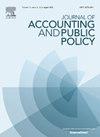Disclosure versus external certification: Evidence from the SEC vote waiver policy for PIPE’s during COVID 19
IF 2.2
3区 管理学
Q1 BUSINESS, FINANCE
引用次数: 0
Abstract
This study investigates how publicly listed firms can raise new funding when voluntary disclosure is limited. Specifically, we investigate whether sophisticated expert investors can act as a source of information and how they can be incentivized to put “skin in the game” to signal their private information. We address our question in the setting of private investment in public equity (PIPE) offerings by inspecting whether PIPE issuance provides an additional source of information in the information valuation game. In the PIPE setting, knowledgeable expert institutional investors buy unregistered stock in a limited firm disclosure environment. Such purchases can act as a certification signal, reducing other investors’ uncertainty. However, we argue that the identification of such certification effect is hindered by potential selection issues as large PIPEs require the approval of incumbent shareholders who may vote against such issuances that dilute their interest. During the COVID-19 pandemic, the SEC facilitated companies’ PIPE issuance by relaxing previously necessary shareholder voting requirements. We use this change, where incumbent shareholders could no longer block large PIPEs, to uncover the presence and magnitude of a certification effect. We document that PIPE funding can provide a positive certification signal in settings with reduced possibilities for voluntary disclosure. In this way, we identify another information channel that may attenuate information frictions in high informational asymmetry environments.
披露与外部认证:来自SEC在COVID - 19期间对PIPE的投票豁免政策的证据
本研究探讨在自愿披露有限的情况下,上市公司如何筹集新资金。具体而言,我们调查了老练的专业投资者是否可以作为信息来源,以及如何激励他们“参与其中”,以表明他们的私人信息。我们通过检查私募股权发行是否在信息估值游戏中提供了额外的信息来源,来解决我们在公共股权(PIPE)发行设置中的问题。在PIPE环境中,知识渊博的专业机构投资者在有限的公司披露环境中购买未注册股票。这种购买可以作为一种认证信号,减少其他投资者的不确定性。然而,我们认为这种认证效果的识别受到潜在选择问题的阻碍,因为大型管道需要现任股东的批准,他们可能会投票反对这种稀释其利益的发行。在2019冠状病毒病大流行期间,美国证券交易委员会通过放宽以前必要的股东投票要求,为公司的PIPE发行提供了便利。我们使用这种变化(现有股东不再能够阻止大型pipe)来揭示认证效应的存在和程度。我们证明,在自愿披露可能性降低的情况下,管道筹资可以提供积极的认证信号。通过这种方式,我们确定了另一种信息渠道,可以在高度信息不对称的环境中减弱信息摩擦。
本文章由计算机程序翻译,如有差异,请以英文原文为准。
求助全文
约1分钟内获得全文
求助全文
来源期刊

Journal of Accounting and Public Policy
Multiple-
CiteScore
4.80
自引率
2.80%
发文量
75
期刊介绍:
The Journal of Accounting and Public Policy publishes research papers focusing on the intersection between accounting and public policy. Preference is given to papers illuminating through theoretical or empirical analysis, the effects of accounting on public policy and vice-versa. Subjects treated in this journal include the interface of accounting with economics, political science, sociology, or law. The Journal includes a section entitled Accounting Letters. This section publishes short research articles that should not exceed approximately 3,000 words. The objective of this section is to facilitate the rapid dissemination of important accounting research. Accordingly, articles submitted to this section will be reviewed within fours weeks of receipt, revisions will be limited to one, and publication will occur within four months of acceptance.
 求助内容:
求助内容: 应助结果提醒方式:
应助结果提醒方式:


